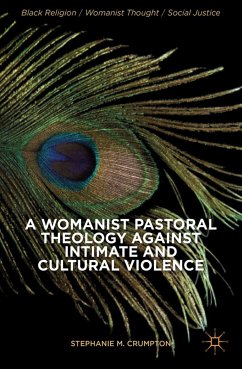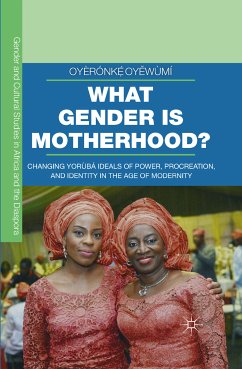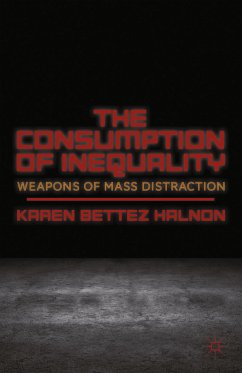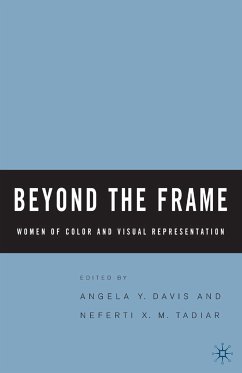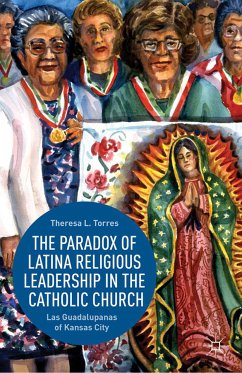
Emilie M. Townes
eBook, PDF
Womanist Ethics and the Cultural Production of Evil (eBook, PDF)

PAYBACK Punkte
48 °P sammeln!






Womanist Ethics and the Cultural Production of Evil (eBook, PDF)
Dieser Download kann aus rechtlichen Gründen nur mit Rechnungsadresse in A, B, BG, CY, CZ, D, DK, EW, E, FIN, F, GR, HR, H, IRL, I, LT, L, LR, M, NL, PL, P, R, S, SLO, SK ausgeliefert werden.
EMILIE M. TOWNES is an ordained Baptist clergywoman and the Carolyn Williams Beaird Professor of Christian Ethics at Union Theological Seminary, USA. She is also Andrew W. Mellon Professor of African-American Religion and Theology at Yale University, has been elected 2008 President of the American Academy of Religion (AAR), the 15,000-member organization. Townes is the first African-American woman to serve as President of the AAR, which is the world's largest association of scholars who teach or research topics related to religion.
Produktdetails
- Verlag: Palgrave Macmillan US
- Seitenzahl: 200
- Erscheinungstermin: 13. November 2006
- Englisch
- ISBN-13: 9780230601628
- Artikelnr.: 38154702
'Emilie Townes is the towering womanist ethicist of our time. In this ice age of indifference and evasion, her powerful voice and viewpoint summon us. And we thank her for her vision and courage!' - Cornel West, Princeton University, USA
'In this book Emilie Townes undertakes an extraordinary inquiry into the cultural production of evil that has aimed at defining African American women as morally depraved. More specifically, she defines cultural evil as a set of romanticized images and stereotypes that originate in the imagination of whites and thereafter transformed into cultural tools of disrespect and degradation. This is a uniquely rigorous study of the internal structure of systemic evil and its pathological products namely,
'In this book Emilie Townes undertakes an extraordinary inquiry into the cultural production of evil that has aimed at defining African American women as morally depraved. More specifically, she defines cultural evil as a set of romanticized images and stereotypes that originate in the imagination of whites and thereafter transformed into cultural tools of disrespect and degradation. This is a uniquely rigorous study of the internal structure of systemic evil and its pathological products namely,
Mehr anzeigen
mammy, Aunt Jemima, Jezebel, Sapphire, Tragic Mulatta, black matriarch, welfare queen, Topsy and others. The multi-dimensional character of cultural evil necessitates a variety of descriptive voices which the author expresses by writing as ethicist,historian, narrator, and poet. Most important, Townes also provides her readers with a cultural antidote for this excellent diagnosis of an enduring cultural disease.' - Peter J. Paris, Elmer G. Homrighausen Professor, Christian Social Ethics, Princeton Theological Seminary, USA
'Womanist Ethics and the Cultural Production of Evil brings together powerful contributions that rested separately in different venues. Studies of structural studies of evil are available but their interior worlds are typically absent. Those interior worlds productive of evil belong to cultural treatments that are often missing in the considerable body of sound theological accounts. The voices of those who endure structural and cultural evil, vividly captured here in history and memory, are neglected as major sources of salient knowledge in all too many accounts. But in these pages, all these weave the work together. It is hard to exaggerate the significance of this book, and easy to be grateful for it!' - Larry L. Rasmussen, Reinhold Niebuhr Professor Emeritus of Social Ethics, Union Theological Seminary, USA
The work of a towering public intellectual! This book is a major achievement in the field of womanist ethics that draws into its orbit popular culture and Foucault, personal memory and public policy. Emilie Townes confirms her position as one of the nation's thought leaders and change agents.' Robert M. Franklin, Presidential Distinguished Professor of Social Ethics, Candler School of Theology, Emory University, and Former President, Interdenominational Theological Center
'Womanist Ethics and the Cultural Production of Evil brings together powerful contributions that rested separately in different venues. Studies of structural studies of evil are available but their interior worlds are typically absent. Those interior worlds productive of evil belong to cultural treatments that are often missing in the considerable body of sound theological accounts. The voices of those who endure structural and cultural evil, vividly captured here in history and memory, are neglected as major sources of salient knowledge in all too many accounts. But in these pages, all these weave the work together. It is hard to exaggerate the significance of this book, and easy to be grateful for it!' - Larry L. Rasmussen, Reinhold Niebuhr Professor Emeritus of Social Ethics, Union Theological Seminary, USA
The work of a towering public intellectual! This book is a major achievement in the field of womanist ethics that draws into its orbit popular culture and Foucault, personal memory and public policy. Emilie Townes confirms her position as one of the nation's thought leaders and change agents.' Robert M. Franklin, Presidential Distinguished Professor of Social Ethics, Candler School of Theology, Emory University, and Former President, Interdenominational Theological Center
Schließen
Für dieses Produkt wurde noch keine Bewertung abgegeben. Wir würden uns sehr freuen, wenn du die erste Bewertung schreibst!
Eine Bewertung schreiben
Eine Bewertung schreiben
Andere Kunden interessierten sich für


